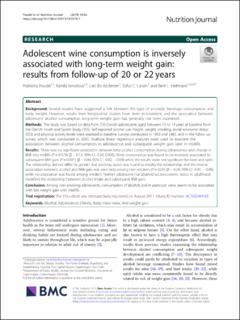| dc.contributor.author | Poudel, Pratiksha | |
| dc.contributor.author | Ismailova, Kamila | |
| dc.contributor.author | Andersen, Lars Bo | |
| dc.contributor.author | Larsen, Sofus Christian | |
| dc.contributor.author | Heitmann, Berit Lilienthal | |
| dc.coverage.spatial | Denmark | en_US |
| dc.date.accessioned | 2020-03-16T13:14:15Z | |
| dc.date.available | 2020-03-16T13:14:15Z | |
| dc.date.created | 2019-10-24T17:21:16Z | |
| dc.date.issued | 2019 | |
| dc.identifier.citation | Poudel, P., Ismailova, K., Andersen, L. B., Larsen, S. C. & Heitmann, B. L. (2019). Adolescent wine consumption is inversely associated with long-term weight gain: Results from follow-up of 20 or 22 years. Nutrition Journal, 18(1). | en_US |
| dc.identifier.issn | 1475-2891 | |
| dc.identifier.uri | https://hdl.handle.net/11250/2647006 | |
| dc.description.abstract | Background
Several studies have suggested a link between the type of alcoholic beverage consumption and body weight. However, results from longitudinal studies have been inconsistent, and the association between adolescent alcohol consumption long-term weight gain has generally not been examined.
Methods
The study was based on data from 720 Danish adolescents aged between 15 to 19 years at baseline from the Danish Youth and Sports Study (YSS). Self-reported alcohol use, height, weight, smoking, social economic status (SES) and physical activity levels were assessed in baseline surveys conducted in 1983 and 1985, and in the follow up survey which was conducted in 2005. Multiple linear regression analyses were used to examine the association between alcohol consumption in adolescence and subsequent weight gain later in midlife.
Results
There was no significant association between total alcohol consumption during adolescence and change in BMI into midlife (P = 0.079) (β − 0.14; 95% CI -0.28, 0.005). Wine consumption was found to be inversely associated to subsequent BMI gain (P = 0.001) (β − 0.46; 95% CI -0.82, − 0.09) while the results were not significant for beer and spirit. The relationship did not differ by gender, but smoking status was found to modify the relationship, and the inverse association between alcohol and BMI gain was seen only among non-smokers (P = 0.01) (β − 0.24; 95% CI -0.41, − 0.06) while no association was found among smokers. Neither adolescent nor attained socioeconomic status in adulthood modified the relationship between alcohol intake and subsequent BMI gain.
Conclusion
Among non-smoking adolescents, consumption of alcohol, and in particular wine, seems to be associated with less weight gain until midlife. | en_US |
| dc.language.iso | eng | en_US |
| dc.publisher | BioMed Central | en_US |
| dc.rights | Navngivelse 4.0 Internasjonal | * |
| dc.rights.uri | http://creativecommons.org/licenses/by/4.0/deed.no | * |
| dc.subject | alcohol | en_US |
| dc.subject | adolescence | en_US |
| dc.subject | obesity | en_US |
| dc.subject | body mass index | en_US |
| dc.subject | weight gain | en_US |
| dc.title | Adolescent wine consumption is inversely associated with long-term weight gain: Results from follow-up of 20 or 22 years | en_US |
| dc.type | Peer reviewed | en_US |
| dc.type | Journal article | en_US |
| dc.description.version | publishedVersion | en_US |
| dc.rights.holder | © The Author(s) 2019. | en_US |
| dc.source.pagenumber | 7 | en_US |
| dc.source.volume | 18 | en_US |
| dc.source.journal | Nutrition Journal | en_US |
| dc.identifier.doi | 10.1186/s12937-019-0478-7 | |
| dc.identifier.cristin | 1740372 | |
| cristin.ispublished | true | |
| cristin.fulltext | original | |
| cristin.qualitycode | 1 | |

